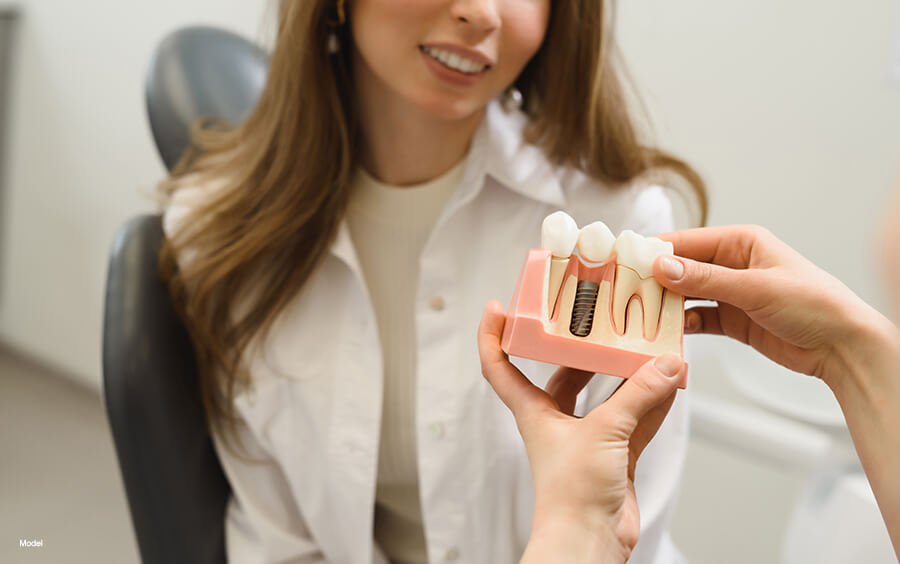Long-Term Benefits of Tooth Replacement With Dental Implants
Missing one, multiple, or all of your teeth can cause problems with oral health care. Teeth perform crucial functions beyond your ability to chew food. Living with missing teeth is not just a cosmetic issue; it can cause the structure of your jawbone and mouth to deteriorate, causing further problems down the road.

You have a few options when replacing missing teeth–be it one or all. However, permanent dental implants’ longevity and multiple benefits greatly outweigh other options. Keep reading to find out why.
What Are Dental Implants?
Dental implants are a permanent solution to tooth loss. A dental implant is made up of a titanium screw design post that is placed deep within the gum, down to the bone, and an abutment (metal or zirconia post) that serves as an anchor for a dental crown (false tooth made of porcelain or other materials).
Dental implants are often superior to other replacement options as they:
- Do not require the alteration of nearby teeth
- Provide healthy stimulation to the underlying bone
- Look, feel, and function like natural teeth
- Can last a lifetime
What Are My Other Tooth Replacement Options?
Alternatively, patients can utilize a dental bridge or removable dentures for missing teeth. A dental bridge is a crown placed in the space of a missing tooth or teeth anchored by the patient’s adjacent natural teeth.
Dental bridges may require the alteration of nearby natural teeth, as they require a solid foundation to attach to. Additionally, as implants do, bridges merely rest on the gum rather than attach to the bone. This can be problematic for a few reasons, as it is easier for food / bacteria to gather underneath the bridge, it can be harder to care for than implants, and a lack of contact to the jawbone can result in bone degeneration in the long term.
How Do Implants Protect the Jawbone?
One or more missing teeth pose multiple problems for your oral health. When a tooth is missing, the jawbone gradually begins to deteriorate. The jawbone is preserved through chewing and biting, as the presence of teeth causes stimulation that signals to the body that the jawbone is healthy. When that stimulation is no longer present, the jawbone begins to break down or resorbs.
Dental implants replace the natural teeth and the stimulation to the jawbone that keeps it strong and healthy. The titanium rod anchoring the dental implant is an artificial tooth root. When you bite or chew, it simulates that natural stimulation is necessary for a strong, healthy jawbone.
Dental bridges and, more drastically, dentures do not provide stimulation, and many patients who receive these treatments experience jawbone deterioration, affecting the aesthetics and function of the mouth over time.
Dental implants provide better structure to the mouth, as they act and feel the same as your natural teeth. While dental bridges, dentures, and dental implants all provide similar aesthetic benefits in that they all use crowns that look like teeth, dental implants are the only option that integrate fully with the underlying bone structure and do not affect the function of the rest of your natural teeth. This option best preserves your bite and smile’s aesthetics, function, and feel.
What Are My Dental Implant Options?
There is no one-size-fits-all solution for tooth replacement, so we’ll break down the various dental implant options, including teeth in a day, for an instant solution you have depending on the number of teeth that need replacement.
Dental Implants for One Tooth
If you need one tooth replaced, a single dental implant can easily fill in the gap and restore your natural tooth function. This is a three-step process that happens over a few months:
- The titanium post is inserted into your jawbone
- Once the implant is fused to the bone (which can take several months), an abutment is added to the post (implant)
- A permanent, fixed crown (artificial tooth) is attached
You will then have a fully functional, aesthetically pleasing solution that helps maintain the integrity of your jawbone, prevents gum disease, and is cared for just like a natural tooth.
Dental Implants for Replacing Several Teeth
If you are missing several teeth, implant-supported bridges provide structure and function for a long-term solution.
This process is similar to replacing a single tooth, as your periodontist will place posts in the gum and allow the bone to bond. Sometimes, your periodontist will use an implant system with extensions already installed with the posts, reducing the steps from three to only two. In any case, your implant-supported bridges will provide a strong structure and a natural-looking appearance to your smile.
Dental Implants for All of Your Teeth
Removable dentures restore the function and look of your smile, but they do not provide enough structure to the mouth. They can result in the degradation of your jawbone, affecting your overall appearance.
Dental implants are available to restore most or all of your teeth rather than utilizing removable dentures.
Interested in Dental Implants in Los Angeles?
Dr. Salamati is a board-certified periodontal specialist in Los Angeles with over 20 years of experience in dental care. He offers various dental and preventative services, including dental implants. Call our office today at (310) 275-1090 to schedule a consultation.
